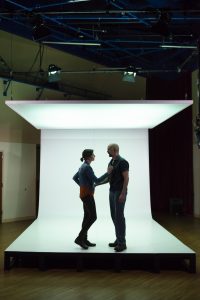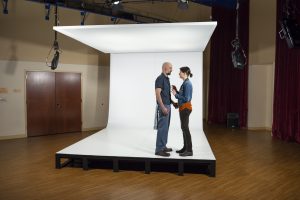How do you express an insight that is complex, particular, personal and yet political, one that cannot be expressed in a sentence or two? For some of us, expressing a differentiated insight requires interminable conversation. For others, writing a book. For Palestinian playwright Hanna Eady and his American collaborator Edward Mast it requires writing a play. Many plays, in fact. Right now in Boston, you can see “The Return” at the Calderwood Pavillon, produced by Guy Ben-Aharon’s “Israeli Stage.” (See http://www.israelistage.com/productions/the-return/)
The Return is about a love-affair between a Jewish Israeli woman and an Israeli Palestinian. There is a complex metaphor right here. As the audience response showed after the show we attended, it depends on who you are, and on your own story, how you parse this metaphor and everything else that happens on the stage: whether you identify with the Israeli woman who escapes to America after betraying her lover to the police and accusing him of false representation, then returns to ask his forgiveness; whether you identify with the hapless Palestinian who pays, for the moment of forgetting his place, with being put in a kind of special hell where he is forced to simultaneously forget and remember his place; whether you feel that the Israeli-Palestinian story only signifies itself or points to a larger truth about power and identity, privilege and exclusion.
The play offers no way out of the constraints of what seems fated, that “iron cage” here represented by police surveillance and hints at brutalization, and ultimately rooted in a zero-sum mentality that is finally acknowledged. The Palestinian, initially a sad creature of ghettoization and control, is eventually released from his internal prison by the return of his former lover. There is a moment of realization and recognition on this island of the mutually condemned, that should also take place and complete itself in the audience. Talya realizes that she cannot overcome her fear that, whenever she tries to see the other person in equal dignity and with equal rights to the land, she will see him as an enemy, out to destroy her. Samer realizes that love is greater than politics. It liberates him to be himself, to retrieve his name, to recognize the place burned off his skin as being indelibly imprinted on his heart. But it is his love for the other that makes him return to himself.
Eady and Mast found a way of elevating the Palestinian Israeli experience by giving it a voice that expresses both itself and something that touches us because it is a human voice. We are told that seeing one another, and seeing one another as human, and acknowledging our deepest fears, is the necessary, though not sufficient, condition to restore our own humanity.
There is another side to this play. Talya, though ostensibly Israeli, serves as the mouthpiece for Ed Mast who, in a conversation following the play, eloquently spoke of his own realization of how blind most white people are to the entitlement that comes with whiteness. Talya, not realizing this, is fated to fail. Her role is more didactic than fully human. She remains obtuse to her actions and is thus fated to repeat the mistakes of the past that she so urgently wishes to erase. She is tragic, because she recognizes that there is something beyond her personal agency. She cannot fix what she’s broken, even though she tries, because she acts without full self-recognition. What her character projects is that love is not strong enough to overcome the systemic politics of control that feeds on the fear of those who impose their collective will on others. The oppressed achieve freedom and dignity, the oppressors, not so much.
What I mind about this is that this role is scripted onto a woman’s body. The Jewish (American) woman has no self-recognition. She remains unredeemed, while the Palestinian man emerges as a transformed and transformative agent who takes his own fate, and hers, into his own hands by recognizing who and where he is. He is the one who awakens from the nightmare. He also reasserts his manhood. The play ultimately reasserts the gendered logic of power that is bound to perpetuate the conflict in one form or another because it assigns justice to one side only, exaggerating the flaws of the other and failing to fully humanize both. Perhaps some degree of agitprop is unavoidable here. Even where it fails aesthetically, political theater has a place in that it makes us think harder about that hard border between politics and humanity.



3 Comments
trunnion ball valve posted on August 26, 2022 at 2:11 am
The Return. Comments on a play by Hanna Eady and Ed Mast | Michael Zank1661494283
Cryptocurrency exchange script posted on November 2, 2022 at 8:14 am
Thank you so much for nice article….
Tesisatçı posted on February 24, 2023 at 1:13 am
Detaylar için su tesisat blogumuzu ziyaret edebilirsiniz.